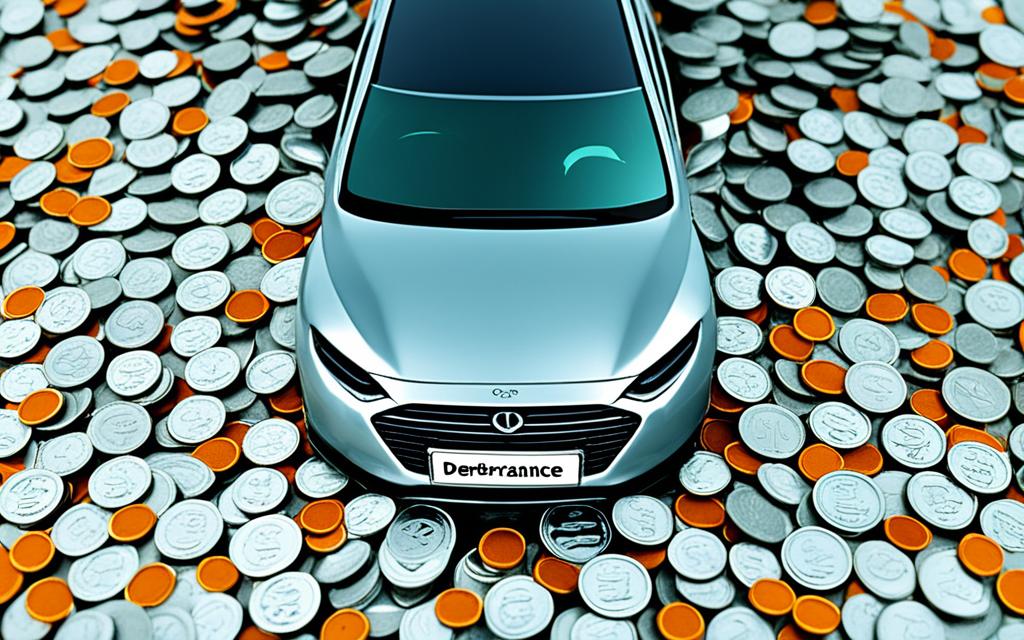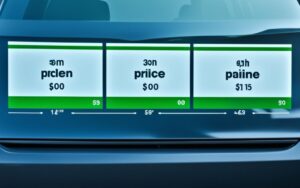Welcome to our informative guide on why you should never pay cash for a car. While it may seem like a straightforward and convenient option, there are several compelling reasons to reconsider. In this section, we will explore the advantages of car payments and why financing options can be beneficial for your financial well-being.
Many individuals believe that paying cash for a car is the best way to go. However, car payments can offer unique advantages that make them a smarter choice. By financing a car, you can establish a credit history, which can be beneficial for future purchases, such as a home or business loan. Additionally, car payments allow for more flexibility in budgeting, as you can spread out the cost of the car over a set period of time.
One of the key advantages of financing a car is the potential for better interest rates. Dealerships often offer competitive financing options with low interest rates, which can save you money in the long run. By paying cash upfront, you may miss out on these favorable rates.
Key Takeaways:
- Car payments offer advantages such as establishing a credit history and flexibility in budgeting.
- Financing a car can provide access to better interest rates, saving you money in the long run.
- Consider the various financing options available before making a decision.
- Keep in mind that paying cash upfront may limit your financial flexibility and opportunities for investment.
- Remember to weigh the total cost of ownership, including insurance, maintenance, and depreciation.
Benefits of Financing a Car
When it comes to purchasing a car, financing offers several benefits compared to paying cash upfront. Whether you’re a first-time buyer or looking to upgrade your current vehicle, understanding the advantages of car financing can help you make a more informed decision. Let’s explore why financing a car can be a smart choice.
1. Establishing Credit History
Financing a car provides an opportunity to establish or improve your credit history. By making timely payments on your auto loan, you demonstrate your financial responsibility and build a positive credit profile. This can be beneficial for future financing needs, such as buying a home or securing larger loans.
2. Flexibility in Budgeting
Car financing allows you to spread out the cost of the vehicle over a set period, typically through monthly payments. This enables you to maintain better control over your budget, making it easier to manage your expenses effectively. By breaking down the purchase into manageable installments, you can allocate your funds towards other financial goals while still enjoying the benefits of owning a car.
3. Potential for Better Interest Rates
When financing a car, you have the opportunity to secure favorable interest rates, especially if you have a good credit score. Lower interest rates can result in significant savings over the duration of your loan. Additionally, some lenders may offer promotional financing options or incentives that make financing more attractive than paying in cash.
By financing a car instead of paying cash, you can not only obtain the vehicle you desire but also enjoy the benefits of credit-building opportunities, flexibility in budgeting, and potential savings through competitive interest rates. It’s important to research and compare financing options to find the best terms that suit your financial situation and long-term goals.
| Benefits of Financing a Car | Paying Cash for a Car |
|---|---|
| Establishes or improves credit history | No impact on credit history |
| Allows for flexibility in budgeting with manageable monthly payments | Requires a large upfront cash payment |
| Potential for better interest rates, resulting in potential savings | No interest savings |
Smarter Financing Options for Buying a Car
When it comes to buying a car, exploring different financing options can be a smart move. Two popular choices are leasing and financing, each with its own advantages and considerations. In this section, we will compare these options to help you make an informed decision.
Leasing
Leasing a car allows you to drive a new vehicle without the commitment of owning it. It typically involves lower monthly payments and requires little to no down payment. Leases are ideal for individuals who prefer driving the latest models and want the flexibility to upgrade every few years.
“Leasing can be a great option for individuals who enjoy driving new cars and don’t want to deal with selling or trading in their vehicle.”
- Advantages of Leasing:
- Lower monthly payments
- Minimal down payment
- Access to newer models
- Less maintenance and repair costs
- Considerations for Leasing:
- Annual mileage restrictions
- Excess wear and tear fees
- No equity buildup
- Not a long-term ownership option
Financing
Financing a car involves taking out a loan to purchase the vehicle. While it may require higher monthly payments and a down payment, financing offers the benefit of eventual ownership and potential equity buildup. Financing is suitable for individuals who prefer long-term ownership and want flexibility in customizing their vehicle.
“Financing provides the opportunity to own a car and build equity over time, offering a sense of pride and financial security.”
- Advantages of Financing:
- Eventual ownership
- Potential equity buildup
- Flexibility in customizing the vehicle
- No mileage restrictions
- Considerations for Financing:
- Higher monthly payments
- Down payment required
- Responsible for maintenance and repair costs
- Depreciation affects resale value
Ultimately, the choice between leasing and financing depends on your personal preferences, financial situation, and long-term goals. It’s important to consider factors such as your desired level of ownership, budget, and anticipated usage to make the right decision for your needs.
For a visual comparison of leasing and financing, take a look at the table below:
| Leasing | Financing |
|---|---|
| Lower monthly payments | Potential equity buildup |
| Minimal down payment | Eventual ownership |
| Access to newer models | Flexibility in customizing the vehicle |
| Less maintenance and repair costs | No mileage restrictions |
| Annual mileage restrictions | Higher monthly payments |
| Excess wear and tear fees | Down payment required |
| No equity buildup | Responsible for maintenance and repair costs |
| Not a long-term ownership option | Depreciation affects resale value |
Credit Builder Loans for Car Purchase
When it comes to financing a car purchase, credit builder loans can be a valuable option to consider. These specialized loans are designed to not only help you obtain the funds needed to purchase a vehicle but also to build or improve your credit score in the process. This section will explore how credit builder loans work and explain the benefits they offer for car buyers.
How Credit Builder Loans Work
Unlike traditional car loans, credit builder loans are specifically structured to assist individuals with limited or poor credit histories. These loans involve borrowing money with the understanding that you will repay it over a set period of time, typically ranging from 12 to 24 months.
However, there is a unique aspect to credit builder loans. Instead of receiving the loan amount upfront, the funds are held in a savings account while you make regular payments toward the loan. This structure allows you to demonstrate your ability to make consistent, on-time payments, which can have a positive impact on your credit score.
Once you have successfully completed the loan term and made all the payments, the funds are released to you, enabling you to use the money as a down payment for a car or to purchase a vehicle outright.
The Benefits of Credit Builder Loans
Credit builder loans offer several advantages for car buyers. Here are some key benefits to consider:
- Opportunity to Establish or Improve Credit: Since credit builder loans are designed to contribute to credit building, they provide an excellent opportunity to establish credit history or improve your existing credit score. Making timely payments demonstrates your financial responsibility, which can open doors to better financing options in the future.
- Flexible Payment Terms: Credit builder loans typically have flexible payment terms, allowing you to choose a repayment schedule that aligns with your budget and financial goals. This flexibility can help you comfortably manage your loan payments and ensure a positive credit-building experience.
- No Credit History Required: One of the significant advantages of credit builder loans is that they often do not require a solid credit history. This makes them an accessible option for individuals with limited credit or no credit at all.
Considerations for Credit Builder Loans
While credit builder loans can be a beneficial financing option, it’s essential to consider a few factors before applying:
- Interest Rates: Credit builder loans may have higher interest rates compared to traditional car loans due to the borrowers’ increased credit risk. However, the overall cost can still be reasonable when weighed against the potential credit-building benefits.
- Loan Amounts: Credit builder loans often have lower loan amounts compared to conventional car loans. It’s essential to evaluate your budget and determine if the available funds are sufficient for your desired vehicle purchase.
- Loan Term: The loan term for credit builder loans is typically shorter compared to traditional car loans. Make sure to assess whether the repayment period aligns with your financial goals and timeline for purchasing a car.
Overall, credit builder loans offer a viable option for individuals looking to finance a car purchase while simultaneously building or improving their credit. By understanding how they work and considering the associated benefits and considerations, you can make an informed decision regarding the best financing strategy for your car buying needs.
Avoiding Paying Cash for a Car: A Wise Move
When it comes to purchasing a car, many people believe that paying cash is the best and most straightforward option. While it may seem appealing to avoid taking on debt and owning the vehicle outright, there are compelling reasons why avoiding paying cash for a car can be a wise financial move.
Advantages of Keeping Cash Reserves
One of the primary advantages of avoiding cash purchases for cars is the ability to maintain healthy cash reserves. By financing a vehicle instead, you can preserve your cash for emergencies, unexpected expenses, or future investments. Having a robust cash reserve provides a valuable safety net, giving you peace of mind and financial security.
Managing Cash Flow
Financing a car allows you to manage your cash flow more effectively. Rather than depleting a significant portion of your savings in a single purchase, you can spread out the cost over a period of time. This helps maintain a steady cash flow and provides flexibility in managing your monthly budget. With the right financing option, you can align your car payments with your income and expenses, ensuring a more comfortable financial situation.
“By financing a car instead of paying cash, you can preserve your cash for emergencies, unexpected expenses, or future investments.”
Potential Investment Opportunities
Choosing financing over paying cash for a car opens up the opportunity for potential investment activities. Instead of tying up a significant amount of money in a depreciating asset, you can leverage that cash to explore other investments that have the potential to grow your wealth over time. By utilizing financing, you can strike a balance between enjoying the benefits of car ownership and making smart investment decisions.
| Advantages of Avoiding Paying Cash for a Car |
|---|
| Maintain healthy cash reserves |
| Manage cash flow more effectively |
| Explore potential investment opportunities |
As you can see, there are several compelling reasons to avoid paying cash for a car and opt for financing instead. Keeping cash reserves, managing cash flow, and exploring potential investment opportunities are all key advantages that can positively impact your overall financial well-being. So, the next time you consider buying a car, think twice before reaching for your wallet and consider the wisdom of financing.

The Long-Term Financial Implications of Paying Cash
When it comes to purchasing a car, paying cash upfront may seem like an enticing option. However, it’s essential to consider the long-term financial implications before making a decision. In this section, we’ll discuss why you should never pay cash for a car and explore the potential drawbacks.
1. Missed Investment Opportunities
One significant drawback of paying cash for a car is the missed opportunity to invest that money elsewhere. By tying up a substantial amount of cash in a depreciating asset, you forgo the potential returns that could be earned through other investments, such as stocks, real estate, or retirement funds. Over time, these missed opportunities can have a significant impact on your long-term financial goals.
2. Lack of Leverage
Another disadvantage of paying cash is the lack of leverage you have when negotiating the car’s price. Financing a car allows you to spread the cost over time, giving you more negotiating power and potentially securing a better deal. Without the leverage that financing provides, you may end up spending more on the purchase price, thus reducing your overall savings.
3. Limited Financial Flexibility
Paying for a car upfront can deplete your liquid cash reserves, leaving you with limited financial flexibility. Emergencies, unexpected expenses, or investment opportunities may arise, and having cash on hand can provide a safety net or allow you to take advantage of favorable financial prospects. By tying up your funds in a car, you may find yourself in a bind when unexpected financial needs arise.
Remember, in the long run, maintaining financial flexibility and capitalizing on investment opportunities can far outweigh the short-term benefits of paying cash for a car.
While paying cash for a car may seem appealing in the moment, it’s crucial to weigh the long-term financial implications. By considering missed investment opportunities, lack of leverage, and limited financial flexibility, you can make an informed decision that aligns with your overall financial goals.
Comparing Cash Payment vs. Financing
| Aspects | Cash Payment | Financing |
|---|---|---|
| Opportunity Cost | Missed investment opportunities | Potential for higher returns through investments |
| Price Negotiation | No leverage | Better negotiating power |
| Financial Flexibility | Reduced cash reserves | Availability of liquid funds for emergencies |
Considering the Total Cost of Ownership
When it comes to buying a car, considering the total cost of ownership is essential. While the purchase price is a significant factor, it doesn’t provide a complete picture of the financial commitment involved. To make informed decisions about car financing, it’s crucial to take into account other expenses that contribute to the total cost of owning a vehicle.
Insurance: Car insurance can be a significant expense. Different vehicles may attract varying insurance rates based on factors such as model, make, age, and safety features. It’s important to research insurance options upfront to ensure you budget accordingly.
Maintenance: Regular maintenance is necessary to keep your car in optimal condition. From routine services like oil changes and tire rotations to unexpected repairs, these costs can add up over time. By factoring in maintenance expenses, you can better anticipate the overall financial commitment of owning a car.
Depreciation: Cars typically experience depreciation, which means their value decreases over time. When financing a car, it’s important to consider how depreciation may impact your investment. Understanding how the value of your vehicle may change can help you make strategic decisions about financing and the length of your loan term.
By factoring in these additional costs, you can gain a clearer understanding of the financial implications of owning a car. This knowledge enables you to make more informed decisions about car financing, ensuring that it aligns with your budget and long-term financial goals.

| Expense | Purchase Price | Insurance | Maintenance | Depreciation |
|---|---|---|---|---|
| New Car | Higher | Varies | Lower | Higher |
| Used Car | Lower | Varies | Higher | Lower |
Table: Total Cost of Ownership Comparison
- Purchase Price: The initial cost of buying the car.
- Insurance: The monthly or annual insurance expense.
- Maintenance: The average cost of maintaining the car per year.
- Depreciation: The estimated yearly depreciation of the car’s value.
Understanding the total cost of ownership helps you make a more comprehensive evaluation of your car financing options. By considering all the financial factors involved, you can make an informed decision that supports your long-term financial well-being.
How Financing a Car Can Align with Your Financial Goals
When it comes to buying a car, financing options play a crucial role not only in acquiring the vehicle but also in aligning with your broader financial goals. By making informed financing decisions, you can effectively manage your resources and optimize your financial health.
Here are some tips and strategies to consider when choosing financing options for buying a car:
1. Evaluate Your Budget and Cash Flow
Before committing to a financing option, take a close look at your budget and cash flow. Assess your income, expenses, and any other financial commitments to determine how much you can comfortably allocate towards car payments. This analysis will help you choose a financing option that aligns with your financial capabilities.
2. Explore Different Financing Options
There are various financing options available for buying a car, such as auto loans, leasing, or personal loans. Each option has its own advantages and considerations. Research and compare the terms, interest rates, and repayment plans offered by different lenders to find the best fit for your financial situation.
3. Consider Interest Rates and Loan Terms
When evaluating financing options, pay close attention to the interest rates and loan terms. A lower interest rate will result in lower overall costs, while favorable loan terms can help you manage your payments effectively. Factors such as your credit score, down payment, and the length of the loan can impact the interest rates and loan terms available to you.
4. Understand the Total Cost of Ownership
When financing a car, it’s essential to consider the total cost of ownership beyond the purchase price. This includes costs such as insurance, maintenance, fuel, and depreciation. Understanding these expenses will give you a clearer picture of the long-term financial commitment you’re taking on and help you choose a financing option that aligns with your overall budget.
By carefully considering these tips and strategies, you can make an informed decision that not only supports your car purchase but also aligns with your broader financial goals.
| Financing Option | Interest Rate | Monthly Payment | Total Cost |
|---|---|---|---|
| Auto Loan | 3.5% | $400 | $24,000 |
| Leasing | 2.8% | $350 | $21,000 |
| Personal Loan | 5.2% | $450 | $27,000 |
This comparison illustrates how different financing options can impact your monthly payments and the total cost of owning a car. Consider your financial goals and priorities when choosing a financing option that best suits your needs.
Conclusion
After exploring the advantages of financing a car and the potential drawbacks of paying cash, it becomes clear why you should never pay cash for a car. Financing a car offers numerous benefits that can align with your long-term financial goals. From establishing credit history to better managing your cash flow, financing allows for increased flexibility and financial stability.
Consider the various financing options available when buying a car, such as leasing or financing. Each option has its own advantages and considerations, so make sure to weigh them carefully based on your specific needs and circumstances. Additionally, credit builder loans can be a viable option for those looking to build or improve their credit while acquiring a vehicle.
It’s important to remember that purchasing a car involves more than just the upfront cost. The total cost of ownership, including insurance, maintenance, and depreciation, should be factored in when making your decision. By financing a car, you can spread these costs out over a manageable period, making it easier to budget and avoid financial strain.
In summary, while paying cash for a car may seem like a simple and hassle-free option, the advantages of financing outweigh the potential drawbacks. By exploring different financing options and considering your long-term financial goals, you can make an informed decision that secures your car ownership while maintaining your financial health.
FAQ
Why should I avoid paying cash for a car?
There are several reasons to reconsider paying cash for a car. Financing a car offers advantages such as building credit history and maintaining cash reserves for other investments or emergencies.
What are the benefits of financing a car?
Financing a car provides various benefits, including the opportunity to establish or improve credit history, flexibility in budgeting with affordable monthly payments, and potentially accessing better interest rates.
Should I lease or finance a car?
Leasing and financing are two different options to consider when buying a car. Leasing offers lower monthly payments and the ability to drive a new car every few years, while financing allows you to own the car and build equity over time.
What are credit builder loans for car purchases?
Credit builder loans are financing options specifically designed to help individuals build or improve their credit while also enabling car ownership. These loans typically have lower interest rates and favorable repayment terms.
Why is avoiding paying cash for a car a wise move?
Avoiding paying cash for a car allows you to keep cash reserves for emergencies or potential investment opportunities. It also helps manage cash flow more effectively and keep financial flexibility for other needs.
What are the long-term financial implications of paying cash for a car?
Paying cash for a car may result in missed investment opportunities, lack of leverage in certain financial situations, and limited financial flexibility. Financing a car offers more options for utilizing available capital.
Why should I consider the total cost of ownership when buying a car?
The total cost of ownership includes expenses beyond the purchase price, such as insurance, maintenance, and depreciation. It is crucial to consider these costs when making a car purchase to ensure it aligns with your financial capabilities.
How can financing a car align with my financial goals?
Financing a car can align with your financial goals by allowing you to make affordable monthly payments while keeping cash reserves for other financial priorities. It also presents opportunities to build credit and improve your financial position.








